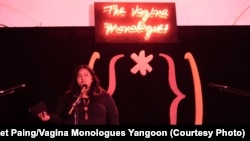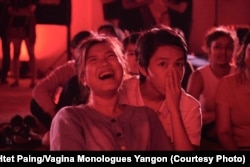Before 22-year-old Phoo Myat Thwe stepped on stage last night to read a monologue in downtown Yangon, her hands went cold.
“I suddenly didn’t know if I could do it - utter moans of sexual pleasure on stage,” said Phoo, who read the story ‘The woman who loved to make vaginas happy,’ exploring women’s pleasure.
“But then I reminded myself, yes this is provocative, but this is about sexual liberation and understanding women’s right to know about their bodies,” said Phoo.
This week was the first time the feminist play ‘The Vagina Monologues’ was performed in Burmese in public.
Hoots of laughter erupted, jaws dropped and all eyes were glued to a small black stage on a rooftop in Yangon, as Myanmar women of all ages took to the stage to read stories that explored the taboo issues of menstruation, consent, sex work and reproduction.
The play was written in 1994 by American playwright and activist Eve Ensler, after she interviewed women of different ages, races and sexualities. It became an instant hit.
“For me I grew up never saying the word vagina in my home, and I was told you can’t show your boobs, society makes you feel shame that our bodies are dirty - a lot of women feel like they are second class citizens,” said Phoo, who is an art writer when she’s not on stage. "It's vaginal liberation, it discusses vaginas in a way that we normally wouldn't speak about them."
Just a play?
The monologues aim to give a voice to women beyond the barriers of race or religion.
Growing up in conflict-ridden Meiktila, Pyay Oo May told the audience at Tuesday night’s opening performance that she was inspired to perform on stage as she has experienced discrimination from a young age.
When authorites came to impose a fine because her all female family couldn’t volunteer anyone to join the rotational security watch duty in their village, they made loud jokes, so that others in the neighborhood could hear. “It was a kind of trauma,” she said.
Although many of the monologues are comical, some explore difficult and harrowing experiences, such as rape during the Bosnian war in the monologue, ‘My Vagina was My village.’
Pyay Oo May said this was the hardest story to listen to. “It was very painful, I feel the girl [in the monologue] is hopeless and [has] lost everything — she is physically alive, but psychologically dead,” she said.
A global V-Day movement
In Myanmar, rape has been used as a weapon of war recorded by many women’s rights groups across the country. Women’s rights groups such as the Karen Women’s Organization have documented these abuses and called for an end to military impunity for abuses committed against all women - Karen, Kachin, Shan and Rohingya.
The Vagina Monologues has become a global V-Day movement that encourages women around the world to perform the monologues as a benefit performance to raise funds and consciousness about ending violence against women.
This year, the funds in Myanmar will go to two groups raising women’s rights in ethnic areas; The Karen Women’s Organization and Ninu Women, a group that supports Chin women fighting for equal inheritance rights for women and an end to bride prices.
When asked for her thoughts on the show, founder of Ninu Women, Mae Len Nei Cer, said: “Only one word - revolution!”
Giving a voice to all women
Last year, over $3,500 were raised for Strongflowers Sexuality Education from the performances when it was performed in English for the first time.
Strongflowers founderDR Thet Su Htwe said she was at first scared to speak on stage about her work. “For me the word vagina is too sensitive in our society, even if it is in English,” she said.
But after reflecting on the education gap about sexual and reproductive health across the country, she decided she would do it. “When I do trainings there is so much people don’t know, they think menstrual blood is dirty and that women can’t get pregnant if they don’t have an orgasm.”
Translation challenges
But choosing a word in Burmese as the translation for vagina wasn’t that straight-forward.
Each performer translated the monologue themselves or worked in a team. Phoo said it was challenging to choose a word that captured the tone in Burmese in conservative Buddhist Myanmar.
She chose ‘a-sae’ for the clitoris, ‘a-phote’ for vagina because men usually use them in a sexual way, but she wanted to take back ownership of the word and bring a positive energy to it. Usually women use a polite phrase of ‘Main-ma-koe’ which translates as women’s body, but Phoo wanted to choose some more striking words.
Another performer, Aye Nilar Kyaw, said her friends are too shy to talk about vaginas, so she hopes “if people from Myanmar come here, and even if they learn the word vagina tonight, I am happy with that.”
Feminist Activist Nandar, producer of The Vagina Monologues in Yangon, said she hopes the stories will reconnect women with their bodies to feel proud.
“For me, it’s an important reminder for Myanmar society to respect women’s bodies and listen to their stories, we need to start a conversation,” she said.





